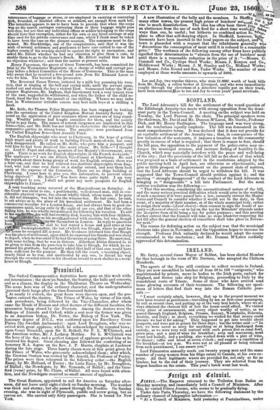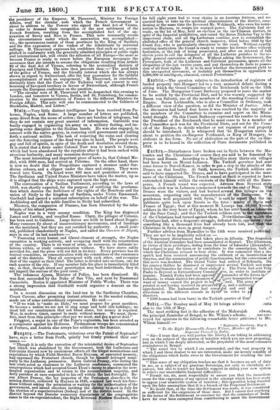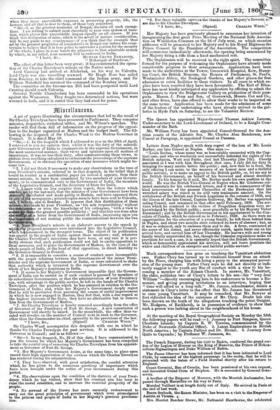foreign nub Colonial.
fraarf.—The Emperor returned to the Tuileries from Baden on Monday morning, and immediately held a Council of Ministers. After this, he visited Prince Jerome, who seems to be gradually dying.
Under date Paris, Thursday, we have the following statement by the ordinary channel of telegraphic information :— " At a Council of Ministers, held yesterday at Fontainebleau, under
the presidency of the Emperor, M. Thouvenel, Minister for Foreign Affairs, read the circular note which the French Government is about to address to the Powers who signed the final Act of Vienna, in -order to demand their recognition of the new settlement of the French frontiers, resulting from the accomplished fact of the an- nexation of Savoy and Nice to France. This note summarily recalls the circumstances under which the annexation was accomplished— viz., the spontaneous cession of those provinces by the King of Sardinia and the free expression of the wishes of the inhabitants by universal suffrage. M. Thouvenel expresses his confidence that such an act, accom- plished in conformity with the generally admitted principles of public right and international law, will obtain the adhesion of all Europe—the more so because France is ready to renew before the European Areopagus the assurance that she intends to assume the obligations resulting from Article 92 of the final Act of Vienna, referring to the neutralized districts of Faucigny and Chablais. The note then proceeds thus The good faith of the policy of France, and the friendly interest which she has always i
shown n regard to Switzerland, offer the best guarantees for the faithful accomplishment of such an engagement.' M. Thouvenel, in conclusion, distinctly hints that the Court of the Tuileries will not consent to any lessening of Savoyard territory in favour of Switzerland, although France accepts the European conference on the question. "The circular note of M. Thouvenel will be despatched this evening to London, and tomorrow to Vienna, Berlin, and St. Petersburg, for commu- nication by the representatives of France to the different Ministers for Foreign Affairs. This note will also be communicated to the Cabinets of Stockholm, Madrid, and Lisbon."
Sit 111--Very little distinct intelligence has been received from Pa- lermo, Naples, and Rome. A large number of letters are published, some direct from the scene of action; there are batches of telegrams, but they do not contain any great amount of information. Garibaldi was busily engaged in organizing his army on a military footing, and im- parting some discipline to the Sicilian bands. He was also engaged, in concert with the native gentry, in restoring civil government and calling forth a national militia. The task of removing the ruins and clearing out the festering corpses of the dead was also in hand. The people were gay and full of spirits, in spite of the death and desolation around them. It is stated that a force under Colonel Turr was to march to Catania, which had been abandoned by the royalists after it had been sacked with atrocious barbarity, and many mansions destroyed.
The most interesting and important piece of news is, that Colonel Me- dici, with 3000 men, had arrived at Palermo. On the other hand, there is now no doubt that the Neapolitans captured a steamer under Sar- dinian colours, and a clipper under the stars and stripes. They were towed into Gaeta. On board were 800 men and quantities of stores. The Sardinian and United States Ministers have taken the matter, up as it is alleged that the ships were captured upon the high seas. The convocation of a Sicilian Parliament, according to the laws of 1848, was shortly expected, for the purpose of ratifying the proclama- tion which decrees the forfeiture of the rights of the Bourbons and the union of Sicily to the kingdom of Sardinia, under Victor EcamanueL Garibaldi had opened a national subscription on behalf of the war. The Archbishop and all the noble families in Sicily had subscribed. Nicotera, the companion of Piscane, has been liberated by the inha- bitants of his island prison.
Naples was in a very uneasy- condition. The King has disgraced
; Lanza and Laititia, and recalled Russo. Clary, the pillager of Catania, has been sent to Calabria. Large forces are held in hand about Reggio. Many rumours fly about of insurrectionary movements, and of landings on the mainland, but they are not certified by authority. A small jour- nal, published clandestinely at Naples, and called the Corriere di Napoli, says in one of its last numbers :-
"Possessing Possessing every honest and liberal element of strength, the Naples committee is working actively, and occupying itself with the resurrection of the country. There is no want of arms, or resources, or intimate re- lations within, or ready communication without. We have stores safely provided for, and the press will not fail in its duty. Every province has its central committee, in communication with the committees of the communes and of the districts. They all correspond with each other, and recognise that of the capital as their chief. The latter is divided into sections, one for each quarter of the city. If any member falls his place is immediately filled up ; so that, though arrest and proscription may hurtindividuals, they do not imperil the success of the good cause."
The infamous Ajossa, Minister of Police, has been dismissed. He was first succeeded by the Duke of San Vito, and next by Emmanuel Caracciolo. Rosica is appointed Minister of Public Works. There was a strong impression that Garibaldi would organize a descent on the mainland.
In a recent discussion on the land-tax in the Sardinian Chamber, Count Cavour, after promising instant attention to the needed reforms, made use of some extraordinary expressions. He said :— "If we wish to 'make an Italy,' we must prepare for great sacrifices. To become a nation we are not to sing songs and hold idle holidays; we must tell our countrymen that not blood alone, but money is required. War, in modern times, cannot be made without money. We must, there- fore, start from this principle—that pay we must, and pay a great deal." Friggieri, a major in one of the Pope's regiments, has been arrested as a conspirator against his Holiness. Piedmontese troops are concentrated at Ferrara, and Austria also arrays her soldiers on the frontier.
J3 Mt g 4.—The Protestants, victorious over the Patent of September have, says a letter from Pesth, quietly but firmly pursued their suc- cesses :—
"Though it is only the execution of the ministerial decree of September last which was abandoned by the Government, both the Lutherans and Calvinists discard now by unanimous efforts all the illegal nominations and regulations by which Field-Marshal Baron Haynau, of execrated memory., had oppressed the Protestant church, though he himself belonged nomi- nally to the Lutheran persuasion. Baron Gabriel Pronay, who during the late crisis acted as chairman to the Lutheran conference, summoned the congregations which had accepted Count Thun's decree to abandon the new- fangled organization and to return to the nonconformist majority, and forty parishes at once responded to his call within the last fortnight. Ba- ron Albert Pronay, the lay inspector of the Protestant churches in the mining district, cashiered by Haynau in 1849, resumed last week his func- tions without asking the permission or waiting for the authorization of the government, and issued circulars inviting the district to meet in July for the election of a superintendent (bishop) and of the district board. In the district beyond the Danube numerous deputations of the congregations came to the ex-superintendent, the Right Reverend Mathew Haubner, who
for full eight years had to wear chains in an Austrian fortress, and re- quested him to take up the spiritual administration of the district, sum- moning at the same time the Reverend Mr. Wohlmuth, who owes his nomi- nation to Haynau, to resign his usurped power. The Calvinists had al- ready, on the 1st of May, held an election in the cis-Tibimean district, in spite of the Imperial prohibition, and raised the Baron Nicholas Vey to the mspectoral chair, and all thg Lutherans combine now to reestablish the abolished office of the genera church inspector, filled before 1849 by the Count Zay, who is particularly. obnoxious to the court. Without exactly courting martyrdom the Count is ready to resume his former office without hesitation, at the risk of being prosecuted, and after an interval of full eleven years to call the delegates of all the Lutheran parishes to the re- gfilar general convention at Pesth. Without asking the Government, the Protestants, both of the Lutheran and Calvinist persuasion, ignore all the illegalities of the last twelve years, and put themselves de facto in possea- sion of all their rights. It is to be seen whether the Government yield to this unexpected movement, or foolishly put themselves in opposition to 3,000,000 of intelligent, educated, earnest Protestants."
I hi if i lt.—The question relative to the introduction of registers of landed property into Hungary led to a very animated debate during a sitting which the Grand Committee of the Reicharath held on the 12th of June. The Hungarian Count Barkoczy proposed to leave the matter to be settled by the Provincial Diet, and he was warmly supported by Baron von Salvotti, one of the members of the standing Council of the Empire. Baron Lichtenfels, who is also a Councillor in Ordinary, took a different view of the question, as did the Minister of Justice. After the discussion had lasted four hours it was resolved by the majority of the members of the Committee to examine and report on the Minis- terial draught. On this Count Barkoczy expressed his resolve to inform the President of the Reichsrath that ho must cease to be a member of the Committee as it was for the Provincial Diets, and not for the Coun- cil of the Empire, to decide whether or not registers of real property should be introduced. It is whispered that 'he Hungarian nation is about to petition the ex-Emperor Ferdinand, as King of Hungary, to abdicate in due form. No act of abdication on the part of the ex-Em- peror is to be found in the collection of State documents published in 1848.
ITT ktfi.—Disturbances have broken out in Syria between the Ma- ronites and the Christians—of course they are said to be fomented by France and Russia. According to a Marseilles story thirty-six villages had been burnt on Mount Lebanon. The Turkish governor had sent some forces to Dar-el-Ktunor, in order to put a stop to the attacks of the Druses on that locality. At Saidi, however, the Turkish soldiers are said to have supported the Druses, and to have participated in the mas- sacre of the Christians. The French consul at Bath is reported to have entrenched himself within the enciente of the Khan with all the Euro- peans. A French vessel was expected. Advices from Beyrout state that the civil war in Lebanon commenced towards the end of May. The Druses were the victors, and had burned several fine villages on the mountain, respecting only the manufactories of the Europeans. "A gentleman well acquainted with Syria," is said to report that the in- habitants quite look upon Russia as the futur master of Syria and France of Egypt ; that at this moment hi. Lesseps has 10,000 Vrencli soldiers in the very heart of Egypt, whom he has intit4uced as labourers for the Suez Canal ; and that the Turkish soldiers sent' to the itasistance of the Christians had turned against them. Notwithstanc.ing ly,;;ch the Christians had, after a desperate struggle, defeated their, °pp.-Yenta ; tintt something like a thousand lives had already been lost, and that the Christians in Syria were in great danger.
Further advices from Marseilles to the 13th were received yesterday. They are not to be implicitly relied on :—
" Sanguinary disturbances had taken place in Albania. The dragoman of the Austrian Consulate had been assassinated at Scutari. The Albanians, in virtue of their privileges, dating from the time of Iskander (Alexander), had refused to pay the taxes or to contribute to the conseripuon, both of which the Christians refused to bear alone. It was rumoured that a de- spatch had been received announcing the outbreak of an insurrection at Smyrna, and the assassination of public functionaries, but the correctness of this news was doubted. The Grand Vizier had arrived at Schurala. On his journey thither he dismissed or imprisoned several Turkish and some Greek functionaries for abuse of their audit" .y. The Porte had sent Yelp Pasha to Beyrout as Extraordinary Commit.; per, in order to institute ay' inquiry. Nam& Pasha had been °ppm '..cr "-mender of the forces i
Lebanon, to whish district two steamers (4ave transported tro want of money caused the project to b med. The army
perated at not having received its arrears I and a mailer apprehended.. The Ambassadors had conc5id and sent
structions to the different consuls in Sy 'in order to p disasters.
"1500 houses had been burn: in the Turkish quarter of Co
Slitia.—The Bombay mail of May 24 brings advices Jatta
also to the 15th of May. The most striking fact is the adhesion of the Maharajah sdwan, the principal Zemindar of Bengal, to Mr. Wilson's scheme, flea con- veyed his opinions in the following remarkable letter Addressed to Mr. Wilson himself ;—
" Itajborree, Burdwan, May 3.
" To the Right Honourable Tames Wilson, Member of the Supreme Council in India. " Sir—I trust that you will pardon the liberty I am taking in addressing you on the subject of the system of taxation which you are now proposing, and in which I am deeply interested, as the proprietor of the most extensive zemindarees in Bengal. "The social ties by which I am surrounded, and the vast property in which I and those dearest to me are interested, make me keenly sensible of the obligations which India owes to the Government for crushing the late mutinies.
"This sense of my obligation teaches me that it becomes an act of duty in me, as a subject of my gracious Sovereign, not only to cheerfully ac- quiesce, but also to tender my humble support in aiding your new system to relieve our unavoidable financial difficulties.
"Permit me, sir, most respectfully to assure you that the immediate cause for this expression of my opinion is the attempt which has been made to oppose your admirable system of taxation ; this opposition being founded upon the false assumption that it is a breach of the perpetual Settlement. No doubt that, at the time the Settlement was made, it was considered as sufficient for the exigencies of those days. But I cannot find anything in the terms of the Settlement to convince use that the zemindars of India have for ever been exempted from contributing to assist the Government
when they incur unavoidable expenses in preserving property, life, the honour, and all that is dear to them, of those very reminders. "Sir—I, as the greatest reminder of Bengal, disclaim all such exemp-
tions. I am willing to submit most cheerfully to your wise system of taxa- tion, which places this unavoidable impost equally on all classes. If you think this declaration of mine, which is the malt of mature consideration, will be any guide to my countrymen—if you think that the example thus set by the greatest proprietor of zemindarees in Bengal can induce his coun- trymen to believe that it is true policy to surrender a portion for the security of the whole, I place in your hands my adherence to that admirable system by which, in my belief, your memory will be endeared to India. I have, &c., Ii1VELTA3J CHORD BAHADOOR, "Maharajah of Burdwan.
The effect of this letter been very great; it has counteracted the opera- tion of Sir Charles Trevelyan's minute on the Native mind. Lord Canning had arrived at Allahabad, on his way to Calcutta. Lord Clyde was also travelling seaward. Sir Hugh Rose has sailed from Bombay, to take the chief command of the Indian army, and Sir William Mansfield has assumed the command of the Bombay army. The committee on the Income-tax Bill had been postponed until Lord Canning should reach Calcutta. General Neville Chamberlain has been successful in his operations against the Wuzeerees. They fought two determined actions, but were worsted in both, and it is stated that they had sued for peace.




























 Previous page
Previous page